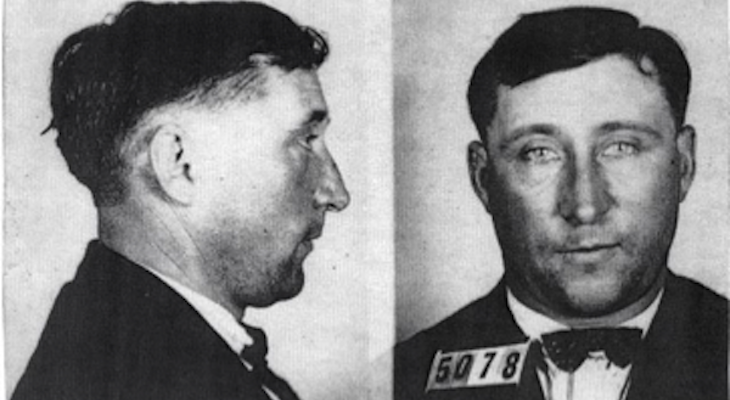By Gerry Griffith
Weelunk Contributor
The Mabel Files Part 4: Music, talk, and danger inside the Minns’ Confectionary
A safe warm gathering place for friendship, but for thieves … not so much
Even though Tom and Lizzie Minns, the blind storekeepers of South Wheeling, their sighted daughter Mabel, and their cranky canine assistant Pal, frequently moved their little store from one South Wheeling location to another during the years of the Great Depression to take advantage of lower rents and better pedestrian traffic, all that really changed were the addresses.
Many of the young people who used Tom’s little confectionary as a hangout pitched in to help move the sparse Minns’ furniture, personal belongings and store inventory when those moves occurred. It was usually just a matter of a few blocks. Whether it was Jacob Street, Wood Street, Eoff Street, or any of the cross-numbered streets, the Minns’ confectionary wasn’t hard to find.
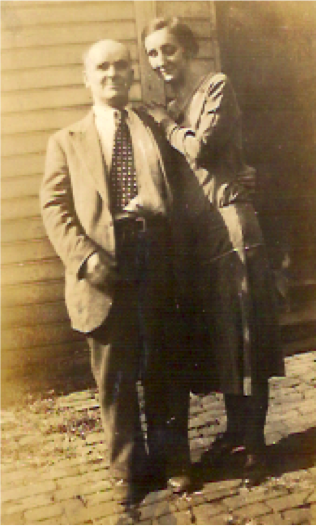
Life inside the store was always the same. Tom stood behind the counter, Lizzie usually sat in the doorway leading to the private one-room quarters and worked on her sewing, and Mabel flitted in and out throughout the day as a busy schoolgirl does. Pal slept on a pillow behind the candy counter and was well behaved when left alone. The mornings were bustling with folks dropping by for quick purchases on their way to school or work. The afternoons brought adult neighbors by to pick up newspapers or snacks. It was late afternoon and into the evening that the Minns’ confectionary really started hopping. That’s when the regular crew of “loafers” showed up. They were mostly all young men either in high school or out on their own trying to make a tough living in a tough economy. Tom’s store was a gathering point for talk, entertainment, and commiseration.
There was usually a radio playing, and while there wasn’t any room for dancing, the loafers made do with toe-tapping and even singing if the tune was popular enough for them to have committed words to memory.
They read newspaper stories aloud and discussed them at length. In the afternoon of March 19, 1932, for example, the topic of discussion was the Moundsville Penitentiary execution of West Virginia’s most prolific mass murderer Harry Power, who may have lured as many as 50 women and children to their deaths in a sound- proof room beneath his Harrison County, W.Va., house. A terrific Clarksburg Telegram news story about his end, like the one they read and talked about that day, is available on the West Virginia Culture and History site.
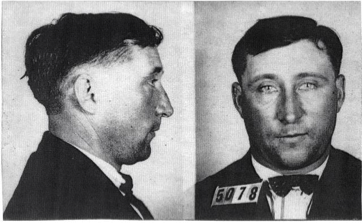
In the fall of 1932, of course, the topic of discussion was the election and the candidacy of Franklin Roosevelt for president and Herman G. Kump for West Virginia governor. The Roosevelt name took on almost mythological proportions in the Minns’ household for decades to come, and his picture remained on the wall in every Minns’ store thereafter.
The Minns’ confectionaries also featured larger-than-life personalities in addition to the proprietors. One of the storerooms that Tom rented had an old upright piano and one of the Minns family’s friends for life certainly knew how to use it. Christopher Cerone, who was also blind and attended the Romney School for the Blind, was a native of New York City but migrated to Wheeling at the urging of Tom and Lizzie after having taught for a few years at his alma mater.
Chris eventually operated the snack bar in the Wheeling Ohio County Building on Chapline Street, but in 1933 he was 30 years old, living at the YMCA at 32, 20th St. (now the Maxwell Centre) and seeking work in Wheeling caning chairs or tuning pianos. Chair-caning is the craft of applying rattan cane to a piece of furniture such as the backs or seats of chairs and was taught as a vocation for blind people at Romney.
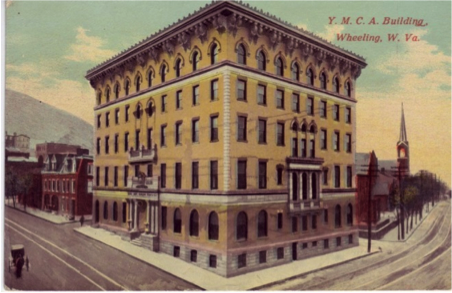
One of Chris’ many talents was playing the living daylights out of the piano. An expert musician well acquainted with many styles, Chris was especially effective at driving the loafers crazy with the boogie-woogie tunes he taught himself. On hot summer nights, his playing and the loafers’ delighted shouting could be heard a full block away. He pounded the keys hard and covered the entire length of the keyboard in smooth fluid motions. Sometimes, when there was room, Tom allowed dancing when Chris was playing. Sales of pop and snacks were brisk to say the least, and that was definitely helpful for the Minns family during the Depression years. To the hearty approval of the customers and Chris, Tom kept that space longer than most of his other locations.
Hard times did inevitably bring cheats and robbers to the store. There were two significant events in the early 1930s: One taught a very young boy a lesson for life, and the other frightened the wits out of just about everybody and served to discourage future robbery attempts.
The tiny bell affixed to the top of the store’s front door jingled one summer afternoon in 1933, and Tom recognized the light footsteps of a child.
“How can I help you young friend?” Tom asked his customer.
“I’d like some gum” a young boy replied. “Wrigley’s please.”
Tom reached into the display case for the gum, but his motion was interrupted by the sound that a handful of candy wrappers make when they are quickly snatched from the countertop and stuffed inside a child’s coat pocket. Then he heard the footsteps headed for the door. Tom put one hand on the countertop and performed a precision jump to come down quickly on the customer side of the display. He stuck the landing and was on the little boy before the child knew what was happening.
“That will be enough of that young sir,” Tom barked as he grabbed the boy’s arm with his right hand and opened the front door with his left. Pal was yapping up a storm and the little bell tinkled again as Tom hauled the little boy out on the brick sidewalk. “We’ll see what the police have to say in this matter.”
Counting his paces, he led the now crying young boy down the block and into a fire station where he knew the crew quite well. The boy saw only uniforms through teary eyes.
“Hey what’s up Tom” asked a fireman at the open front door.
“I’d like to turn over this hooligan for thievery,” Tom said to the fireman putting an index finger to the side of his nose as a signal that a scam was afoot. “I know you will make sure he’s given the proper punishment.”
“No, no I’m sorry,” the boy sniffed. “Please don’t arrest me.”
“Yes sir, Mr. Minns, we will certainly deal with the scoundrel,” the fireman replied.
After the young culprit shed a few more tears, Tom thought he had made his point. He knelt and put both hands on the boy’s shoulders. He told him to stop crying and calmly explained that no matter how hungry tired or broke he may become, taking from someone else was never okay. Tom added that being caught as a real thief could land him in prison and ruin his life. Then Tom spoke to his friend the fireman.
“Thank you, sir, but I believe the young man has learned his lesson. We will not need your services this day.”
The boy gave the candy bars back to Tom before shuffling north on Chapline Street, humbled and ashamed but thoughtful. Forty-five years later, when Mabel told me the story, she didn’t give the identity of the thwarted candy thief. She only indicated that he grew up to be a respected community leader.
The second incident was more frightening. It was a cold, blustery winter afternoon in 1934 when a young man entered the store. There was a neighborhood woman examining a collection of canned goods in the far corner and two older gentlemen discussing politics in front of the pop cooler. Pal was asleep in the corner. Before Tom could utter his usual friendly greeting, he heard a gruff voice.
“I need all the money you have, old man, and I need it now,” the man said.
Tom couldn’t know if the man was armed, but he perceived real threat in his tone of voice. When the stranger barked the demand out, the two customers ceased their political discussion immediately and turned toward the action. In shock, the shopping woman dropped a can of corn she had been examining, and it rolled across the floor creating a sound that caused the robber to look away from Tom for an instant. The speedy little Irishman used the noise as his cue. To the shock of the robber and the store customers, Tom suddenly stood defiantly behind his counter, feet apart, and knees slightly bent with a little silver pistol no one had ever seen before pointed in the direction of the robber’s voice.
“Not today, buster” Tom shouted as he cocked the little lethal weapon. He manipulated the muscles around the eye socket that held his big green glass eye, which made it bulge in an intimidating fashion.
The sight of a blind man waving a cocked pistol had an immediate impact on everyone in the little store. The customers knew Tom and knew he couldn’t see a thing. The two men hit the floor with a thud. The woman shrieked and knocked over the remaining cans of corn as she sought cover. Pal, stirred from his doggy slumber, began yapping and growling.
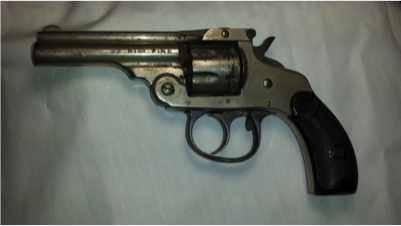
The stranger, who looked into the bulging glass eye in terror, had no reason to doubt that Tom could see him well enough to put a slug between his eyes. He took a chance, spun around and headed for the door, knocking over a table full of bread products before reaching the exit. The tinkling of the little bell over the door and the sound of a slam brought relief to everyone. Tom lowered his weapon and smiled and the customers got to their feet.
“Good Lord, Tom,” exclaimed one of the customers. “Where in hell did you get that pistol, and how do you know how to use it?”
“Never you mind,” Tom replied. “Never you mind. How about a bottle of pop?”
That was the last time anyone ever tried a strong-arm robbery on T. J. Minns.
More Mabel Files:


